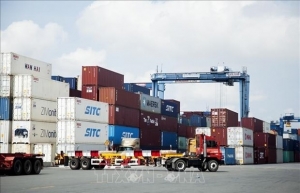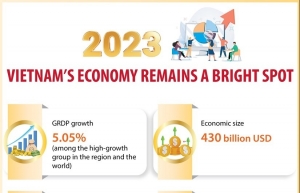Constant reassessment can protect businesses
As someone deeply engaged with the financial market, how would you assess 2023?
It was one of the most difficult years for the Vietnamese economy, reflected in a GDP growth rate of only 5.05 per cent, lower than planned. In a 10-year period, the growth was only higher than 2020 and 2021 – the two peak years of the pandemic. As businesses face many challenges, I have interacted with many business leaders who are confused as market demand in certain fields has almost disappeared.
 |
| Tran Dinh Cuong, chairman and country managing partner at Ernst & Young Vietnam Ltd |
However, I think the difficulties are only short-term. We have seen signs of improvement in the global economy since late 2023, when the pace of interest rate increases in major economies showed signs of cooling.
In the United States, the job market improved in the last two months of 2023, consumption increased sharply, and the consumer price index showed signs of cooling down, especially in the second half of 2023, causing the Fed to say they would end the cycle of raising interest rates, and planned to cut rates in 2024.
The domestic market also sees many bright spots in terms of exports, controlling inflation and attracting foreign direct investment (FDI). Vietnam’s trade surplus was $28 billion in 2023, more than double the previous year. It was also the 10th consecutive year that inflation has been controlled within target.
In the context of declining global investment capital flows, investors continue to choose Vietnam as a destination. Total registered FDI capital in 2023 is estimated to reach $20.19 billion, an increase of 62.2 per cent compared to the previous year.
Where do you think businesses will find the most opportunities?
Looking at the long term, we have many advantages. In the international market, Vietnam is more favourable thanks to continuing to maintain effective cooperation with major partners in the world. Vietnam has also signed many bilateral and multilateral free trade agreements with the most vibrant markets.
According to EY analysis, Vietnam can become a modern industry with high average income by 2030. That same year, Vietnam will have 48 million people with an income over $20 per day, more than those in Thailand, the Philippines, and Malaysia.
In terms of human resources, Vietnam has a young, hard-working, creative, and especially eager to learn workforce. The society’s level of investment in education is large, leading to a well-trained workforce. While there are also shortages of high-level, high-tech labour, the workforce’s tendency to integrate and catch up with international standards is improving.
Furthermore, advancements in technology and sustainability, particularly in emerging technologies, provide Vietnamese companies with opportunities for rapid advancement and competitive parity with global counterparts, as these trends disrupt and reshape industry norms.
What are the critical differences between successful businesses and those that fail in difficult times?
Every business faces unique challenges, and success or failure can be subjective and time-dependent. However, in my interactions with businesses of varying scales, I’ve observed commonalities among them.
Resilient businesses prioritise fundamental aspects like effective corporate governance, sound financial management, flexible business models, decisive leadership, and a skilled team. These elements enhance their ability to withstand shocks and adapt to changing times. Just like if you want to build a bigger and higher house, the foundations must be strong.
In my observations, businesses exiting the market often lack effective risk management. Some may overlook the need for precautionary measures during favourable times as they lack crisis experience. This mentality is understandable given limited capital, causing businesses to prioritise investment expansion rather than preparing for mishaps.
Businesses have grappled with geopolitical uncertainties and evolving trends like sustainable development and technological change. Do you believe we are in the midst of a pivotal moment?
I don’t see it as a sharp turn. Every year, businesses have to adjust the steering wheel. At EY, every year, we reassess what the market needs, what we are doing, and what we can do better, rather than waiting for a 5-10 year cycle to look back and change. However, it is true that the need for transformation has never been as urgent as now.
If in the 1960s-1970s, the global trend was to optimise investment portfolios and capital allocation, the 1990s-2000s were globalisation and breakthroughs. From 2020 onwards, it’s about creating long-term value. EY’s research strongly suggests that people now demand greater accountability from the organisations they work for, buy from, and invest in. Businesses with long-term values will earn consumer and social trust, gain loyal customers and reputation, reduce risks, and enhance the ability to secure capital and retain talent.
Long-term value is no longer narrowly defined as profits for shareholders, but is expressed through customer value, people value, societal value, and financial value.
To reach long-term goals, intangible assets such as human resources, organisational culture, consumer trust, and investment in innovation become more important than ever.
You are recognised for being the first Vietnamese to work at EY America, the first to attain a Certified Public Accountants (CPA) degree in the US, and the first Vietnamese leader of a Big 4 accounting group in Vietnam. What lessons did your early international experience give you?
I came to America in 1997 and my first feeling was of being overwhelmed. I felt a lack of confidence and uncertainty about whether I could survive in that market, let alone develop. There were just so many new things. I felt like I was in the woods, and playing on someone else’s field according to their rules is very difficult. But even if you are confused at first, you figure out that everything can be learned.
The CPA exam in the US is very difficult. Many of my colleagues at that time had to divide it into two stages: the goal of the first stage was to pass two of four subjects, then the next stage was to pass the remaining two subjects. Of course, I was very worried. I had just moved to America and had to work full time and take care of my family, all while studying for exams. What should I do? My answer was effort.
Working in the most competitive environment in the world like the US was an experience that made me more humble and more confident. I’m humbler because I saw that the world was big and there were many good people. But I’m also more confident because I understand that while people born in a good environment will have many advantages, it doesn’t mean they’re superior. That is a gap that can be compensated with effort.
It’s the same in business. Whoever is faster and more dedicated will win. If we are dedicated to our work, always thinking about how to do better and bring more value to customers, we will succeed. Enough passion and determination will make a difference. I believe that everyone who is dedicated to business will find their path.
 | Vietnamese economy likely to expand by 6.5 per cent in 2024: Economist The Vietnamese economy is likely to expand by 6-6.5 per cent in the base scenario, with even recovery recorded in all sectors of agriculture, industry, construction and services, Dr. Can Van Luc, a member of the National Financial-Monetary Policy Advisory Council, has predicted. |
 | Vietnam’s economy remains a bright spot in 2023 The trend towards economic recovery continued in Vietnam, with each successive month revealing further improvements over the previous month and each subsequent quarter surpassing the prior quarter. The country essentially achieved its overall goals and posted significant results in various sectors. It remained a bright spot amid a rather challenging global economic landscape. |
What the stars mean:
★ Poor ★ ★ Promising ★★★ Good ★★★★ Very good ★★★★★ Exceptional
Related Contents
Latest News
More News
- Citi economists project robust Vietnam economic growth in 2026 (February 14, 2026 | 18:00)
- Sustaining high growth must be balanced in stable manner (February 14, 2026 | 09:00)
- From 5G to 6G: how AI is shaping Vietnam’s path to digital leadership (February 13, 2026 | 10:59)
- Cooperation must align with Vietnam’s long-term ambitions (February 13, 2026 | 09:00)
- Need-to-know aspects ahead of AI law (February 13, 2026 | 08:00)
- Legalities to early operations for Vietnam’s IFC (February 11, 2026 | 12:17)
- Foreign-language trademarks gain traction in Vietnam (February 06, 2026 | 09:26)
- Offshore structuring and the Singapore holding route (February 02, 2026 | 10:39)
- Vietnam enters new development era: Russian scholar (January 25, 2026 | 10:08)
- 14th National Party Congress marks new era, expands Vietnam’s global role: Australian scholar (January 25, 2026 | 09:54)

 Tag:
Tag:



















 Mobile Version
Mobile Version